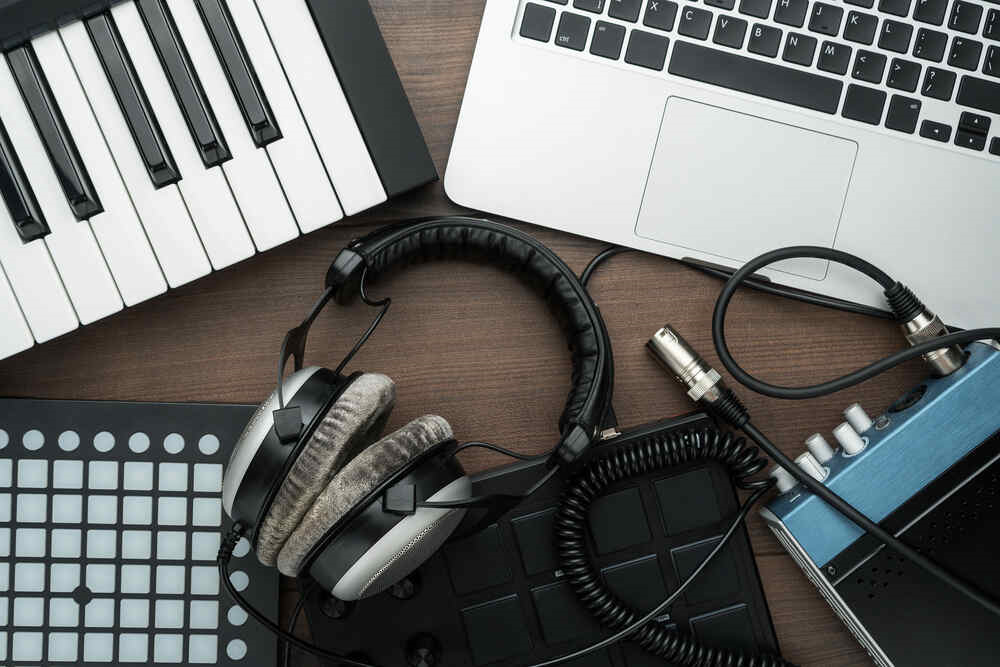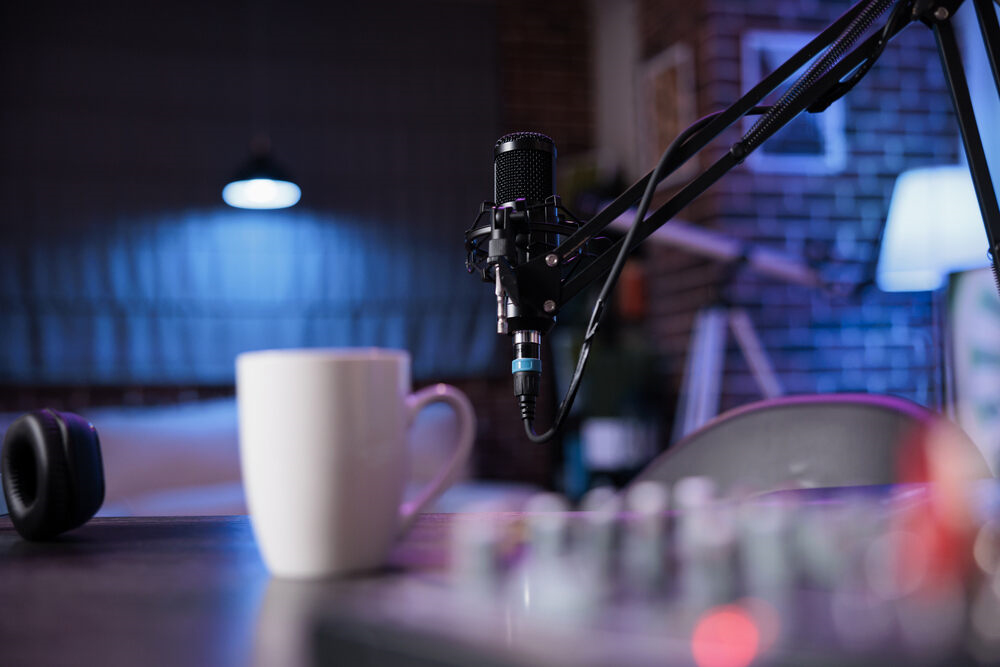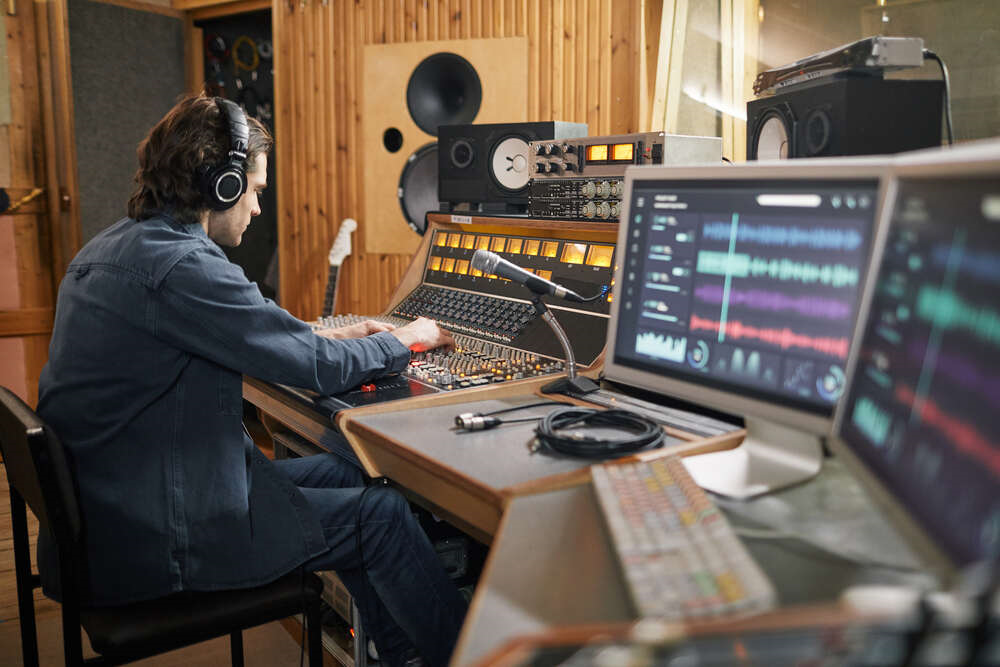Intro
We can all unanimously agree that content and knowledge are available for all on the internet, and audio equipment is becoming more and more accessible and easy to set up. Then if anyone can set up a podcast environment correctly following simple youtube tutorials, and information on every subject is now free for all, what makes a podcast more successful than others? Why do we recognize some podcasts as more influential than others? The answer is the host. Podcast hosting is the key piece that can make or break a podcast. So how can one become a better podcast host?
Some other factors like the quality of guests invited and sponsors can affect the success of your podcast, still, no amount of money or famous people can cover up poor podcast hosting. We could secure Johnny Depp for your next episode, but if you don’t know what to ask, how to ask it, and generally how to lead a fruitful exchange with him, you would lose your audience’s interest.
This is why we feel that sharing the best practices to become a better podcast host with you is important. In this article, we will cover the best practices you can adopt to become a better podcast host. We filtered many experts’ opinions to keep only the most actionable ones that you can apply right away. Read on to discover what can make your podcast a true lasting success through every step of the production.
How to Become A Better Podcast Host – Pre-Production

You might think that podcast hosting starts when you hit record, but that’s not quite right. It starts right at the beginning when you’re defining your guest list. Podcast hosting is more than just a conversation, it’s a vision and strategy.
Do your homework
There is an intense conversation on whether content creators should be more spontaneous instead of prepping their work. However, the most influential podcasts do prepare because they can’t afford to disappoint their audience. That alone should tell you that doing your homework before recording the episode is a must. What do we mean by homework you might say?
- Stay on track
Always prepare your episode with the main theme in your head. You want the conversation with your guest to go in the direction of what you promised your audience when you first announced you would start a podcast. Imagine how they would feel if your first post on social media promised a subject, but then because your guest is interested in something else you completely switch directions. A lack of coherence will put you out of the market instantly. We believe it’s important to sketch out around 10 episodes before starting your first podcast season. This way you can ensure that each one of them fits the main theme.
- Find the best fit for your episode
Your guests should be able to offer some value to your listeners. When defining your guest list for the next season, think of how they could offer some of the answers you promised your audience when starting the adventure. You should establish a list of four to five criteria that your next guests fulfill before approving them. These criteria should always be directly linked to your main theme, thus, making sure that you’re not going off track.
- Research
Your audience is not expecting you to be an expert. In fact, more expertise is expected from your guests. Nevertheless, they still want you to ask the right questions, and expect you to be knowledgeable so that you can conduct a proper conversation. Do your research wherever you can. Check out your guest’s biography if available, listen to prior podcasts they have been on, watch videos they might have done on Youtube, and write down everything you find interesting and might want to expand on. Notice everything you think they didn’t share yet, and prepare questions about it. By doing so, you will make sure that some information provided on your podcast will be exclusive, as no other media provided that yet. Your research should also include your audience. Who are they? So that you can precisely determine your niche. What do they want? And why would they be interested in your podcast? Answer these questions and you will know exactly what your audience wants. You can then choose your interview questions while keeping them in mind to make sure you are providing them with value. You want to become the “go-to” person in your niche and create a trust that will reverberate well beyond downloads and listens. You do that by consistently providing well-informed material and pushing dialogues with exceptional guest inquiries. Give something to your audience they can’t find anywhere else.
- Prepare the episode’s outline
Communication is a deal-breaker in podcasting. Write down an outline for how the episode would go, so that you can eliminate unnecessary rambling or pauses and secure the smooth conduct of guest interviews. Divide your podcast into main parts and write them down. Define everything from what would go in the intro to how you would transition from one question to another. Leave nothing to chance. A well-prepared outline will help you conduct your podcast with confidence and ease. You will spend less time thinking of what to say next and more time enjoying your conversation with your guest. An enjoyable conversation creates a cozy ambiance for your listeners and embarks them in the flow of your podcast. This creates a feedback loop in which you are motivated by your audience enjoying you having a good time podcasting.
- Prep with your guest
Sharing your research and questions with your guests is crucial to making sure your episode runs smoothly. The last thing you want is a guest who isn’t pleased with your poking around, and who leaves with a negative impression they will definitely share with everyone they can. Either send them an e-mail detailing everything you will discuss with them on the episode, or even go a step further and set up a prep call to cover everything vaguely. This can also get your guest accustomed to being interviewed if they never did before. Make sure you also cover the technical aspects of recording with your guest. Share with them the best practices for remote recording if you’re doing it online, or studio recording if you’re interviewing them in person. Once you make sure your guest is comfortable with the episode’s outline, and the conversation will be valuable to your audience, you can move on to production.
How to Become a Better Podcast Host – Production

You can now understand how good preparation naturally leads to smooth podcast hosting. Once everything is in place for the episode to start, your mind is freed from all organizational worries. Good preparation will greatly help you become a better podcast host.
While you might be celebrating the fact that everything is perfectly prepared for an amazing show, there are still a couple of best practices that can help take your hosting to the next level while recording.
Check your audio quality
The appreciation of your content is only as good as your equipment is. Your audience might still enjoy your well-organized thought-provoking content but might reconsider your podcast if recorded poorly. If you can’t afford top-notch audio equipment, try at least to apply some best practices for recording:
- Try to record in fabric or carpeted rooms: It has surfaces that absorb the sound and kill most natural reverberations. Avoid dense shiny rooms as they will reflect sound to your mic.
- Wear headphones while recording: It keeps each individual recording clean and free from any interference. You don’t want your mic to pick up your input twice while recording.
- Stay away from noise: Place your mic as far away as you can from any noisy background. This will help you produce clean audio without any need for heavy noise removal in post-production.
- Stabilize your mic: Your mic’s position at the start of the episode should be the same as when you conclude. Avoid holding your mic when recording, changing its direction, or adding something next to it. This will change your soundscape and you’ll find yourself with a different output than what you prepared for.
- Set your recording levels: You want to avoid any clipping as much as you want to avoid your sound being inaudible. Set your audio levels correctly, and make sure your mic is in a position where you can check your levels and readjust them if needed. Generally, a good peaking level of -6.0 dB is good for podcasts. This will ensure your audio sounds good when you convert it to a lossy format like MP3 or AAC. The levels can always be increased in post-production, however the clipping distortion can be very difficult to remove or sometimes even impossible.
Check yourself before you wreck …your audio
There are so many ways in which our voice can be altered subtly, and our tone can sound annoying. Especially if the main channel of content consumption is audio. Your listeners’ attention is tuned and focused on every audible detail generated.
Loud chewing and gulpy drinking, if done excessively, are both perfect examples of what can ruin a good episode. A good mic will pick up these human reflexes with extreme detail, and that can be an unpleasant listening experience for your audience.
Here’s some advice to make sure your voice is warm and pleasant for the ear:
- Avoid milk: It produces phlegm, which might impair your speaking voice and make it harder to provide flawless performance.
- Avoid caffeine: It is a dehydrating agent that will leave you clearing your throat throughout the interview.
- Jog in place: It will warm you up, clear up your head, and get your blood pumping. All good for a clear warm tone.
- Don’t be too serious: Too much seriousness can lead to a rigid stance and a rigid tone. Smile more during the interview, it will naturally give a more soothing presence to your voice that will please your audience.
Lead your interview authentically
Conduct your podcast and lead it the way you want it to be. Even when your guest strays away from the content you want to provide for your listeners, use subtle transitions and non-verbal clues to lead him back to the heart of the conversation. You’re the one who sets the tone of the interview and keeps it moving in the proper direction.
Your audience is mainly here for you and for what you offer. If they wanted your guest only, there is a high chance they can find him on another podcast. So be yourself, and speak from your heart as if you’re speaking to a dear friend. Leading the interview from a genuinely authentic place can go a long way in securing your listeners’ trust.
If you stutter or make a linguistic mistake, laugh at it. It will create a friendly environment where your guest and your audience can feel at ease. Many of us listen to podcasts on the road, while working out, or while preparing for an interview. Podcasters are now virtual friends that accompany us in our daily lives. Might as well be a true authentic friend that doesn’t feel like a scripted news reporter.
Here are a couple of best practices to help lead your interview correctly:
- Give your guest enough space to speak his mind; don’t babble over one other.
- Don’t listen with the intent to reply, listen to understand.
- Don’t impose your views and opinions just because it’s your podcast. Let your guest share his experience and knowledge.
- Don’t multitask; Give your guest your full attention.
- Speak slowly and clearly to maintain a steady pace of conversation.
- Avoid overloading the conversation with details. It might scatter your listeners’ attention.
- Don’t ask another question before your guest fully answers the former.
- Avoid yes/no questions that can block the conversation.
- Always refer back to your outline to make sure your questions are on track.
Include your audience
Mention your audience a couple of times to make them feel part of your podcast. You could simply start a question with “The listeners want to know…”, welcome them into the show on the intro, or incite them to leave their opinions in the comment section of your social media. Anything to let them know that they are appreciated and that this podcast was made for them.
How to Become a Better Podcast Host – Post-Production

Post-production is also an important aspect of podcast hosting that shouldn’t be ignored. The quality of follow-up treatment you provide to your content is vital to making it easy to digest for your listeners. There are a couple of best practices you want to apply post-production to become a better podcast host.
Edit your episode
A good host provides his listeners with top-notch audio deliverables. Take what you recorded and create a storyline for your episode by rearranging and cleaning up the pieces. You want your show to always have a beginning, a middle part, and an ending that are coherent. Get rid of all the unwanted artifacts like noise, coughs, and anything that you think might annoy your audience, and then mix your podcast to sound professional.
If you’re unsure how to proceed or still struggling, consider visiting our podcast production services page.
Create a transcript and show notes
A podcast transcript helps search engines like Google, Yahoo, and Bing index your episode and make it easily searchable online. Because search engines do not index the content contained within digital audio files, creating a transcript allows your podcast to be found online.
Furthermore, you want to include every potential audience out there, even people with listening issues. An inclusive podcast host has a good image with the public and shows that they care.
Follow up with your guest
Following up with your guest after your interview is a courteous way to show them appreciation for the time they took to attend your show. In a way, they helped you co-produce your content by providing meaningful answers to your inquiries.
Let them know that you appreciate their effort by sending them a follow-up e-mail with important details such as the date your episode will air, the added value they brought to your podcast, and a thank you note at the end. Some podcasters even send them merch as a sign of appreciation.
Establishing a positive relationship with your guests is important to your long-term success, regardless of how you do it. You never know who they can refer you to after some time, therefore, be thoughtful, grateful, and proactive.
Conclusion
There you have it! A list of actionable tips that you can formulate into a concrete plan to become a better podcast host. The competition is pretty fierce out there, so break the ceiling and take your podcasting to another level where you differentiate yourself from every other podcaster.
Your ultimate takeoff should be the relationship with your audience. Always keep them in mind and try your best to answer their needs and to provide exactly what they came for.



Comments
No comments yet!